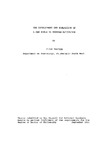Development and evaluation of a new scale to measure motivation
| dc.contributor.supervisor | Hyland, Michael | |
| dc.contributor.author | Thacker, Clive | |
| dc.contributor.other | School of Psychology | en_US |
| dc.date.accessioned | 2011-05-10T15:25:54Z | |
| dc.date.available | 2011-05-10T15:25:54Z | |
| dc.date.issued | 1991 | |
| dc.identifier | Not available | en_US |
| dc.identifier.uri | http://hdl.handle.net/10026.1/352 | |
| dc.description | Merged with duplicate record (10026.1/835) on 03.01.2017 by CS (TIS) | |
| dc.description | This is a digitised version of a thesis that was deposited in the University Library. If you are the author please contact PEARL Admin (pearladmin@plymouth.ac.uk) to discuss options. | |
| dc.description.abstract |
This programme of research was undertaken with the aim of using psychometric techniques to develop and evaluate a new scale to measure motivation. An initial hypothesis was stated, proposing that five related factors could be used to describe individual differences in certain motivational determinants. These factors are Goal Coherence, Strength of Will, Planning, Perseverance, and Self Evaluation. A questionnaire was constructed, and versions administered to 813 subjects over 5 studies. The resultant data were subjected to maximum likelihood factoring, and the solutions rotated obliquely. Results from each study led to successive refinements of the questionnaire, and an eventual rejection of the initial hypothesis in favour of a single factor of future-oriented motivation labelled Goal Coherence, measured by a 15-item questionnaire.Three further studies were undertaken to test the Goal Coherence questionnaire for convergent and divergent construct validity, internal consistency and test-retest reliability. These studies yielded generally encouraging results. Two final studies, set in the future-oriented context of contingent versus noncontingent path behaviour, were undertaken to test the validity of the scale against external behavioural criteria. It was predicted that there would be a significant positive relationship between Goal Coherence and problem solving in a contingent path condition. It was further predicted that no such relationship between Goal Coherence and performance would be observed in the noncontingent condition. In the second study, it was predicted that the ability to recognise a contingent path would increase as a function of Goal Coherence scores. Results from both studies appeared to give some support to the predictions. It is concluded that the Goal Coherence questionnaire possesses potential as a useful measure of future-oriented motivation, and as a platform for continuing research. Current and planned applied uses of the questionnaire are described, and directions for future research are suggested. | en_US |
| dc.description.sponsorship | Science and Engineering Research Council | en_US |
| dc.language.iso | en | en_US |
| dc.publisher | University of Plymouth | en_US |
| dc.subject | Psychology | en_US |
| dc.title | Development and evaluation of a new scale to measure motivation | en_US |
| dc.type | Thesis | |
| dc.identifier.doi | http://dx.doi.org/10.24382/4942 | |
| dc.identifier.doi | http://dx.doi.org/10.24382/4942 |
Files in this item
This item appears in the following Collection(s)
-
01 Research Theses Main Collection
Research Theses Main


